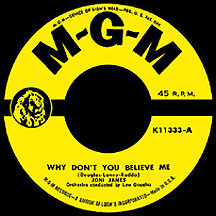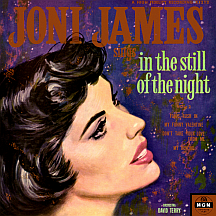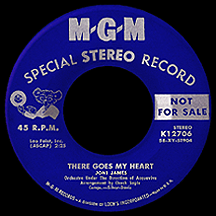JONI JAMES
Joan Carmella Babbo was ambitious. She dreamed of growing up and having a glamorous career as a dancer, or a model, or a singer. While all of these dreams were to come true, life's little problems kept getting in the way, steering her down different paths. There were a couple of routine operations, for example, the first of which halted one of those goals-in-progress at age 17. The second at 23 could have derailed a career that had already begun to flourish...yet everything worked out fine.
When she was very young, Joan (later nicknamed Joni) loved to sing and dance. At home, or on the way to school and back in clear view of her entire South Chicago neighborhood, there you'd find Joni being Joni. Her parents, Angelo and Mary Babbo, were Italian immigrants, and the singing and dancing may very well have been her way of dealing with the death of her father. He had succumbed to cancer when she was five, a devastating loss for the entire family. Those who knew Joni in those 1930s depression days saw only an outgoing, happy young girl; she dealt with tragedy in as positive a way as possible, feeling life had an endless array of possibilities for her to explore. As a teenager she sang in the school choir and took ballet lessons, working a part time job to cover the cost of the lessons and contributing the rest of her earnings to the family. Hoping to eventually study ballet in New York, while still in high school she found work as a model with a management firm aggressive in landing jobs for her. Around this time she decided on the professional name Joni James.
A successful audition for the Dorothy Hild ballet troupe in New York was a break for Joni, as was a part in a Chicago production of the Broadway musical Bloomer Girl, but an attack of appendicitis and resulting operation before the opening not only sidelined her debut but, after a slow recuperation, she found the demands of ballet much more difficult. That first operation forced her to go with the backup plan: she would take a shot at a professional singing career, continuing to model for the time being in order to finance her training. Modeling long-term was not an option; for Joni it came easy and she desired more challenge. Performing at small events, she gradually built her confidence as a singer, while the modeling agency landed her a "which-came-first, chicken-or-egg?" type of assignment: selling Zenith TV sets - on TV!
Agent, songwriter and all-around record man Roy Rodde saw one of Joni's Zenith commercials and became her manager. The money for Joni's first recording session came out of her own pocket...I guess management types don't necessarily contribute funds to a singer's cause! Her first two singles were released in 1952 on a local Chicago label, Sharp Records. One of these, "You Belong To Me" (written by Chilton Price with country bandleader Pee Wee King and singer Redd Stewart), was recorded at about the same time by Jo Stafford, becoming a number one hit for the seasoned songstress. Joni had been beaten to the punch, but bounced back just a couple of months later when MGM signed her and "Why Don't You Believe Me" was recorded at the first session. With Lew Douglas conducting the orchestra, Joni's haunting, faraway-sounding plea was in distinct contrast to the prevalent style of the era's top singers: the close-miked and more straightforward works of Stafford, Doris Day and others or the double-tracked grandstanding of Patti Page and Mary Ford. Joni's song stood apart; hitting number one on the charts in late November, it stayed on top through the end of the year.
The next year or so was a whirlwind for the young singer, with several major hits including "Have You Heard," "Almost Always" and her cover of one of Hank Williams' signature songs. A session had been in the works for the labelmates to sing together, but his death on January 1, 1953 prevented that. "Your Cheatin' Heart" was one of her biggest hits on the pop charts, yet Hank's original became a posthumous country smash that overshadowed hers at the time and has grown by leaps and bounds in the years since. Joni's country leanings were clear throughout her pop music career; she later performed at Nashville's Grand Ole Opry.
"Nina-Non," Joni's contribution to the Christmas season, was followed by a nonproductive 1954. If it seemed Joni had taken an abrupt leave of abscence, indeed she had, due to her second operation in a five year span, this one a tonsillectomy. Fears that her vocal chords might be affected were not unfounded. After the healing process it was obvious her voice had changed...some would say for the better. For a singer barely in her twenties, the early recordings revealed a very mature vocal quality. After the operation she sounded more high-pitched, with a clarity and younger sound unlike before. It was a subtle change, but if one compares her 1952 through '54 recordings to anything from 1955 and later, the difference is noticeable. No one complained about the "new" Joni; some may not have even detected the change. As a result, other than the several months of downtime, Joni's career continued unabated.

"How Important Can It Be?" put Joni back on the charts in 1955 at the same time as a version of the song by Sarah Vaughan. At the start she'd had to deal with a competing release of "Why Don't You Believe Me" by Patti Page, but how would she fare going head-to-head with the Divine One? As it turns out, quite well. Both records were hits, but Joni's gained the upper hand, putting her in the top ten for the first time in well over a year. The single featured backing by The Ray Charles Singers; featured on Perry Como's many mid- to late-'50s hits, they enjoyed a run of their own in 1964 and '65 including "Love Me With All Your Heart" (Joni's television debut as a singer had been on The Perry Como Show in November 1952 when her first hit was number one). She was a staple of many TV variety programs in the 1950s, including Como's variety show, The Milton Berle Show, The Steve Allen Show and The Ed Sullivan Show, where she was a favorite of Mr. "Really Big Shoo" himself.
Her marriage in 1956 to composer and orchestra leader Anthony Acquaviva (known professionally as, simply, Acquaviva), led to a series of collaborations featuring lush string arrangements, evident on her hits "There Goes My Heart," "There Must Be a Way," "Little Things Mean a Lot" and most others from the late 1950s period. In 1960 she became the first American pop singer to record at London's Abbey Road Studios (a few years before The Beatles showed up there) with Acquaviva and arranger Geoff Love leading what was essentially a 141-member group, 100 Strings and Joni (adding a choir of 40 voices), her last name no longer a necessity in the billing. After "My Last Date (With You)" (a vocal answer to Floyd Cramer's instrumental "Last Date") the hit singles stopped, but a series of 100 Strings and Joni albums followed. She had become such a big star around the world by this time that she had her own private plane, which was painted pink and named "Joni's Pink Cloud." She made many trips to Europe, Asia and other points overseas.
Joni James left the music business in 1964. It wasn't because of an operation, or a lack of demand, that she retired from performing at the age of 33. Her marriage to Acquaviva clearly wasn't your typical show-biz marriage; when he fell ill, Joni decided to focus on raising their two adopted children and care for her husband, which she did until his death in 1986, after which she resumed her career, playing for several years to packed theaters.
NOTABLE SINGLES:
- You Belong To Me - 1952
- Why Don't You Believe Me/
Purple Shades - 1952 - Have You Heard /
Wishing Ring - 1953 - Your Cheatin' Heart - 1953
- Almost Always /
Is It Any Wonder - 1953 - My Love, My Love - 1953
- Nina-Non - 1953
- In a Garden of Roses - 1954
- How Important Can it Be? - 1955
- You Are My Love - 1955
- My Believing Heart - 1955
- Don't Tell Me Not to Love You - 1956
- I Woke Up Crying - 1956
- Give Us This Day /
How Lucky You Are - 1956 - Summer Love - 1957
- There Goes My Heart - 1958
- There Must Be a Way - 1959
- I Still Get a Thrill - 1959
- I Still Get Jealous - 1959
- Are You Sorry? - 1959
- Little Things Mean a Lot - 1960
- I Need You Now /
You Belong To Me - 1960
as 100 Strings and Joni - Choir of 40 Voices - My Last Date (With You) - 1960





